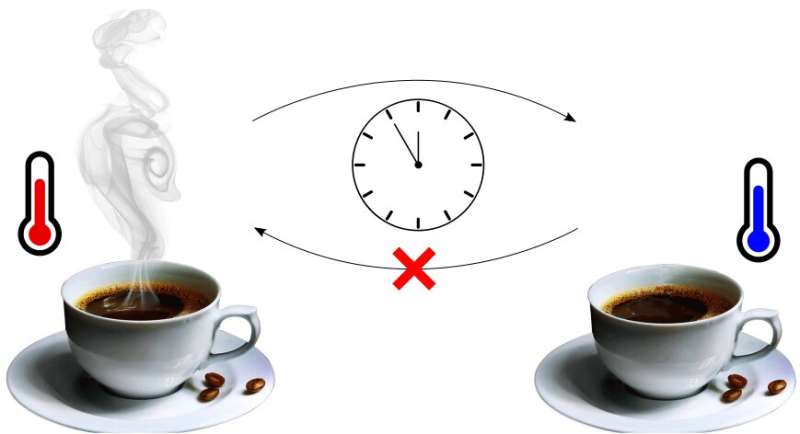August 11, 2020 feature
Study unveils the unstable nature of some topological phases

In recent years, physicists worldwide have been conducting studies exploring the characteristics and dynamics of topological phases of matter that could enable the development of quantum devices and other new technologies. Some of these phases are supported by what is known as the time-reversal symmetry (TRS) of microscopic laws of nature.
Researchers at the University of Cambridge have recently demonstrated that some topological phases protected by TRS are fundamentally unstable against coupling to their surrounding environment. Their findings, outlined in a paper published in Nature Physics, highlight a number of challenges that could be associated with the use of topological systems for developing quantum technologies.
"We have been interested in certain phases of matter known as topological phases, which have attracted a great deal of attention recently because of their proposed applications in quantum-based technologies," Max McGinley, one of the researchers who carried out the study, told Phys.org. "In particular, some topological phases are thought to be able to store quantum information in a way that is naturally robust to any imperfections that inevitably arise in experiments, making them potentially useful for quantum computation."
Most existing theoretical arguments justifying the robustness of topological phases to experimental noise do not consider the fact that in real implementations, these systems may interact with their surroundings in unexpected ways. With this in mind, McGinley and his colleague Nigel R. Cooper set out to investigate whether topological systems still performed well when they are used to develop quantum memory devices and in the presence of external "environmental" effects. Their initial findings point to a general principle that could apply to all topological phases, rather than specifically to those that enable the storage of quantum information.
"We showed that there is a certain class of topological phases (known as time-reversal symmetry-protected topological phases) that become unstable when they interact with the environment around them and so cannot be utilized in the real world," McGinley said. "Much of our analysis was based on the effects of symmetries in quantum mechanics, which are central to the theory of topological phases."
Symmetries naturally limit the processes that can or cannot occur in physical systems. In topological systems, for instance, a particular symmetry can prevent quantum information from being lost.
The more conventional types of symmetries existing in nature are those related to spatial coordinates. For example, a square has a symmetry under a rotation of 90 degrees about its center. TRS is a more subtle type of symmetry that arises within a dynamical system's physical description. Essentially, TRS means that in a physical system, the laws of physics look the same when time is running forward and backwards.
"Strangely, this symmetry isn't reflected in the large objects we meet in our everyday lives (i.e., systems made up of very many microscopic particles)," McGinley explained. "For example, a hot cup of coffee will cool down over time, but a cold cup of coffee will not spontaneously heat up. We realized that this disparity between the symmetries of nature's fundamental laws and the symmetries of complex many-particle systems (such as your cup of coffee) also shows up in topological systems. The topological phases that rely on time-reversal symmetry are the ones that are unstable for the exact same reasons."
The study highlights the possible limitations of using TRS-protected topological systems to develop quantum technologies. More specifically, the researchers observed that some topological phases are far less robust to environmental noise than what existing theories predict.
"A pessimist might see this as bad news for the field," McGinley said. "However, our view is that our results can help those working to put topological systems into practice. Having identified which topological phases are unstable, future attention can be focused on those that can, in principle, be shielded from these adverse environmental effects."
The new principle applies to all topological phases, but the researchers have so far primarily investigated it in the context of quantum memories or other quantum technology. In their next studies, they plan to test and study the same principle in relation to other applications.
"For example, some topological phases are expected to have interesting electrical conductance properties, but experiments do not show the same robustness as one would expect based on current theories," McGinley said. "Perhaps the ideas that we have uncovered here could be used to explain some aspects of these experiments."
More information: Max McGinley et al. Fragility of time-reversal symmetry protected topological phases, Nature Physics (2020). DOI: 10.1038/s41567-020-0956-z
Journal information: Nature Physics
© 2020 Science X Network





















